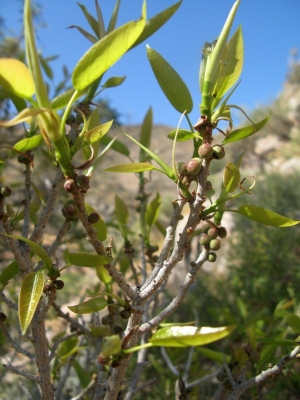Ficus ilicina
(Sond.) Miq.
Moraceae
Ficus guerichiana Engl.
Urostigma ilicinum Sond.
Common Name:
General Information
Ficus ilicina is an evergreen tree that can grow up to 6 metres tall. The plant posseses a peculiar growth form whereby it grows espalier-like against near-vertical rocky faces, either extending up broken cliff-faces to a height of 35 metres, or climbing to, and often enveloping, small granite boulders[
328- Title
- African Flowering Plants Database
- Publication
-
- Author
-
- Website
- http://www.ville-ge.ch/musinfo/bd/cjb/africa/recherche.php
- Publisher
- Conservatoire et Jardin Botaniques.
- Year
- 0
- ISBN
-
- Description
- Contains information on over 150,000 plant names (including synonyms) giving a description and habitat, plus a distribution map.
]. The stems and branches are usually flattened[
328- Title
- African Flowering Plants Database
- Publication
-
- Author
-
- Website
- http://www.ville-ge.ch/musinfo/bd/cjb/africa/recherche.php
- Publisher
- Conservatoire et Jardin Botaniques.
- Year
- 0
- ISBN
-
- Description
- Contains information on over 150,000 plant names (including synonyms) giving a description and habitat, plus a distribution map.
].
The plant is sometimes harvested from the wild as a local source of food, tannins and dyestuff.
Known Hazards
None known
Botanical References
Range
Southern Africa - southern Angola, Namibia, S. Africa.
Habitat
Rock surfaces in dry areas at elevations around 1,300 metres[
328- Title
- African Flowering Plants Database
- Publication
-
- Author
-
- Website
- http://www.ville-ge.ch/musinfo/bd/cjb/africa/recherche.php
- Publisher
- Conservatoire et Jardin Botaniques.
- Year
- 0
- ISBN
-
- Description
- Contains information on over 150,000 plant names (including synonyms) giving a description and habitat, plus a distribution map.
].
Properties
| Edibility Rating |      |
| Other Uses Rating |      |
| Habit | Evergreen Tree |
| Height | 5.00 m |
| Pollinators | Wasps |
| Cultivation Status | Wild |
Cultivation Details
Fig trees have a unique form of fertilization, each species relying on a single, highly specialized species of wasp that is itself totaly dependant upon that fig species in order to breed. The trees produce three types of flower; male, a long-styled female and a short-styled female flower, often called the gall flower. All three types of flower are contained within the structure we usually think of as the fruit.
The female fig wasp enters a fig and lays its eggs on the short styled female flowers while pollinating the long styled female flowers. Wingless male fig wasps emerge first, inseminate the emerging females and then bore exit tunnels out of the fig for the winged females. Females emerge, collect pollen from the male flowers and fly off in search of figs whose female flowers are receptive. In order to support a population of its pollinator, individuals of a Ficus spp. Must flower asynchronously. A population must exceed a critical minimum size to ensure that at any time of the year at least some plants have overlap of emmission and reception of fig wasps. Without this temporal overlap the short-lived pollinator wasps will go locally extinct[
413- Title
- Global Invasive Species Database
- Publication
-
- Author
-
- Website
- http://www.issg.org/database/welcome/
- Publisher
-
- Year
- 0
- ISBN
-
- Description
- Very detailed information on almost 400 species (with more being added) of plants that have become weeds in areas outside their native range.
].
Edible Uses
Fruit - raw[
299- Title
- Protabase - Plant Resources of Tropical Africa.
- Publication
-
- Author
-
- Website
- http://www.prota.org
- Publisher
-
- Year
- 0
- ISBN
-
- Description
- An excellent on-line database with detailed information on over 3,200 species of useful plants of Africa.
]. The globose fruit is around 10mm in diameter[
299- Title
- Protabase - Plant Resources of Tropical Africa.
- Publication
-
- Author
-
- Website
- http://www.prota.org
- Publisher
-
- Year
- 0
- ISBN
-
- Description
- An excellent on-line database with detailed information on over 3,200 species of useful plants of Africa.
].
Medicinal
None known
Other Uses
The bark is a source of tannins[
299- Title
- Protabase - Plant Resources of Tropical Africa.
- Publication
-
- Author
-
- Website
- http://www.prota.org
- Publisher
-
- Year
- 0
- ISBN
-
- Description
- An excellent on-line database with detailed information on over 3,200 species of useful plants of Africa.
].
The bark is used as a dye[
299- Title
- Protabase - Plant Resources of Tropical Africa.
- Publication
-
- Author
-
- Website
- http://www.prota.org
- Publisher
-
- Year
- 0
- ISBN
-
- Description
- An excellent on-line database with detailed information on over 3,200 species of useful plants of Africa.
].
Propagation
Seed -
If you have any useful information about this plant, please leave a comment. Comments have to be approved before they are shown here.




 Useful Tropical Plants Database 2014 by
Ken Fern,
web interface by
Ajna Fern
with help from
Richard Morris.
Useful Tropical Plants Database 2014 by
Ken Fern,
web interface by
Ajna Fern
with help from
Richard Morris.